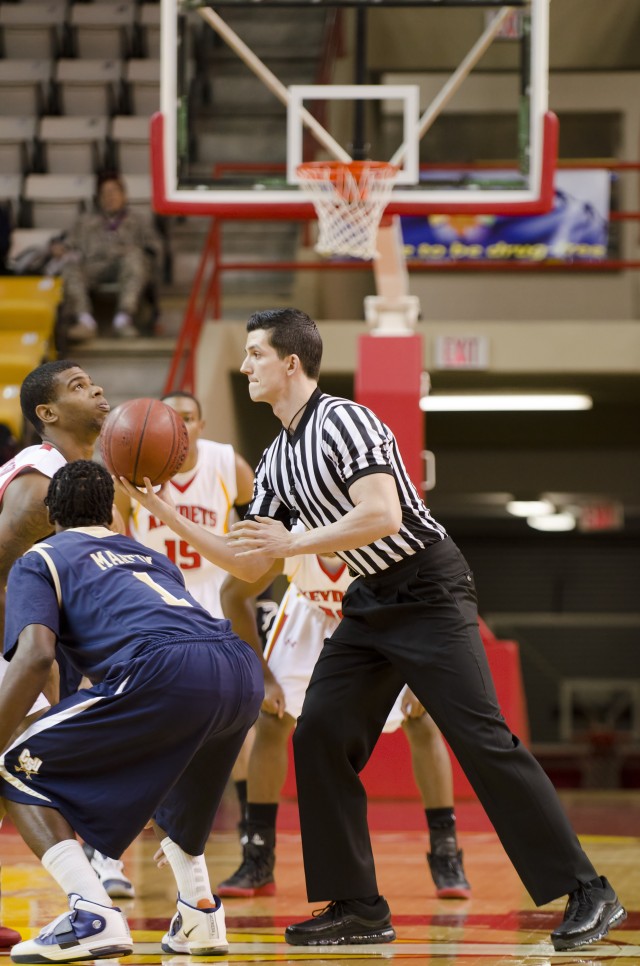Tim Haddix is a whistleblower and doesn't care who knows it. That's because he saves his whistle blowing for the basketball court.
When Haddix is not at work, the information technology specialist at Fort Belvoir, Va., for the Army Contracting Command's Information Management Directorate, is running up and down the basketball court officiating National Collegiate Athletic Association Division I basketball games across the country. He has eight years of experience at the college level.
Plenty of kids watching basketball grow up wanting to be like Michael Jordan or some other big-name player. Not Haddix; he wanted to be the official. At 15, he started officiating in Terre Haute, Ind. at the local boys club.
"I realized that being a referee isn't something you just wake up and do. You need to have a commitment to this craft," said Haddix.
After time officiating at the local boys club, Haddix moved up to high school games, then eventually to the college level. He was later selected to specifically work Division I college games and at one point, spent three years in the National Basketball Association's Referee Development Program where he was evaluated for a position with the NBA referee staff.
Haddix worked games during the NBA summer leagues and camps. The level of talent ranged from Orlando Magic's Dwight Howard to lesser-known first- and second-year players and draft prospects. The NBA program involved intensive training sessions in small groups.
"We spent several hours going over the first five to ten minutes of various games in film sessions. We reviewed everything from rules, floor positioning, plays, dealing with players and coaches, to how officiating affects our personal life, goals, and values," said Haddix.
Haddix was released from the NBA program in 2009 and credits his success in college to the training he received in the developmental program.
Currently finding time to officiate three to four games per week, Haddix ensures his scheduling point of contact knows his availability.
"A referee's schedule can be flexible for some and hectic for others. Some of the top-tier officials work more than 100 games in one season, literally traveling every night," said Haddix.
After eight years and counting in officiating, Haddix still gets nervous before each game.
"The butterflies never go away. In my first Division I college game I was extremely nervous because I was so focused on not messing up any calls. It was a Big South Conference assignment, a non-conference game at Coastal Carolina University in December of 2006. It was the second-smallest gym in Division I, only seating 1,100, but it felt like 11,000," said Haddix.
"After tip-off and a couple of minutes into the game the nervousness slowly fades away." Haddix knows that communication between coach and referee is strained and intense. But at the end of the day he doesn't take the hostility personally because it's all about basketball.
"When dealing with coaches, you have to develop responding skills in order to diffuse situations on the court because it can get intense. I'm a part-time referee. Coaching is their full-time job; whether they win or lose their jobs are on the line," said Haddix. "Interacting with coaches depends on the personality I'm dealing with. There are times where a coach barks at me and I have to bark right back. Some coaches are nice guys before the game starts but once the ball goes up, it's a different story; they turn into psychos on the court."
In addition to high-strung coaches, screaming fans and a fast-paced game, Haddix has one more obstacle he faces on the court, his age.
"Age is my biggest challenge because I'm much younger than my peers and I have a young look," said Haddix, who is now 30. "When I was 24 officiating games, the coaches would flip out whenever I walked into the gym because they thought I wasn't any older than half of the players on their roster. A younger referee can make all the right calls but the coaches would feel more comfortable with a veteran who may not be as efficient, all because of the look."
Aside from his officiating peers, Haddix has another set of eyes watching the game closely--instant replay. The number of cameras directed at the same play from different angles serves as the moment of truth and can prove a referee's call to be right or wrong. Haddix said as long as the video backs him up he has no reason to second guess his calls.
But even as hard as they try to make the right call, referees make mistakes, often resulting in ridicule from coaches and fans. To reduce their mistakes, Haddix and the referee team review videos during halftime of the game they're officiating and note what they're doing right and what they need to improve on in the second half. Once the game is over they review the video to assess their strengths and needed improvements.
Haddix tolerates heckling fans, irate coaches, and makes decisive calls in a split second because that is what the position calls for. The one thing he didn't count on was how officiating games would change his love for watching the sport.
"I can watch football and enjoy the game but with basketball I'm watching the referee more than the players. I'm uncontrollably refereeing every play in my mind, even if it's on TV." said Haddix.
Spoken like a true referee.


Social Sharing